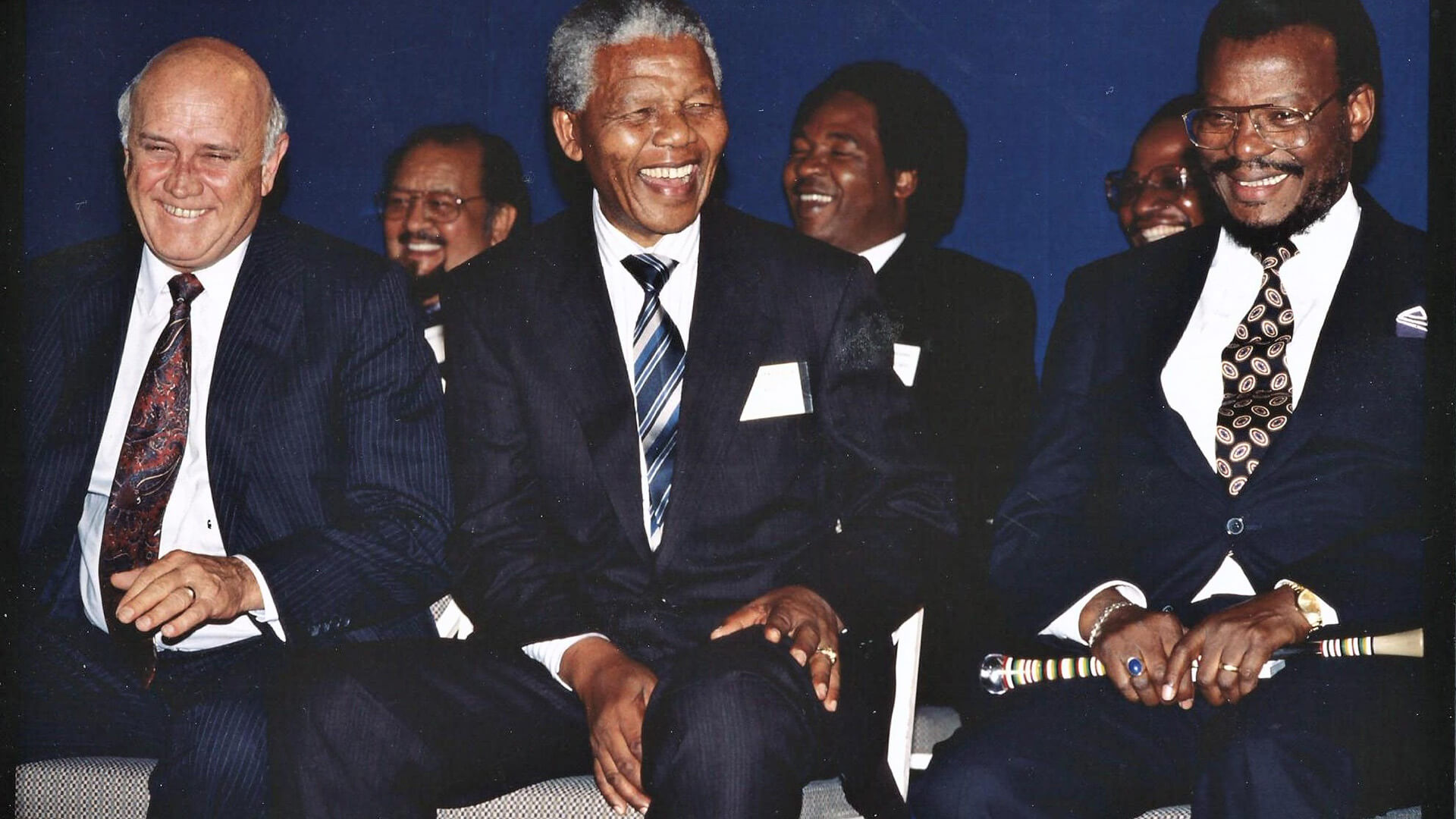About the episode
In this podcast Ciara McCombe speaks to Professor Colin Bundy about the end of apartheid. Together they discuss why and how apartheid ended, the factors that brought the ANC and the National Party to the negotiating table, and the nature of the political settlement that they reached.
We are grateful to Revd Dr Liz Carmichael for a copy of this photograph which appears in her book Peacemaking and Peacebuilding in South Africa: The National Peace Accord, 1991-1994
Podcast length: 54 min 55 sec
Use the Drop-down menu below to view the Questions posed by Ciara McCombe to Professor Colin Bundy in this episode
Questions and Podcast Timings
00:00 Introduction
01:35 In your view, why did apartheid end?
03:24 Why had the ANC been seen as the legitimate government of South Africa?
06:06 What were the reasons that pushed the National Party to negotiate?
10:26 Why did the ANC negotiate instead of just taking power?
15:20 What was the most important reason for both sides to sit at the negotiation table and discuss the end of apartheid?
20:33 What made the National Party agree to the compromises they made?
23:08 What changed between the 1960’s and 1980’s that led to South Africa being boycotted?
26:47 What was the role of Barclays in South Africa and what was the cause of it withdrawing from South Africa?
29:31 What role did the Congress for South African Trade Unions (COSATU) and the United Democratic Front (UDF) play in destabilising apartheid?
36:40 How did P.W Botha try to reform apartheid and how did his party challenge it?
40:15 What was the role of violence in the end of apartheid?
44:31 Did the IFP and UDF have seats at the table during the negotiations?
47:29 What is the legacy of apartheid in South Africa today?
”“The United Kingdom, European countries, were unwilling to implement economic sanctions that had any bite at all. They preferred what was called at the time ‘constructive engagement’, particularly under Nixon and Reagan in the US and under Margaret Thatcher in the UK.
Colin Bundy
That was the preferred option; ‘We will engage constructively, we'll tell them that apart it is nasty, but no, we won't impose economic sanctions. We won't stop the arm sales’ and so on. And then during the 1980s, partly because of what was happening in the country, because of that tide of resistance and because of the, , steps that the South African government took against protestors, that suddenly shifted and economic sanctions began to become real.”
The ‘main’ signatories of the National Peace Accord: President F.W. de Klerk, Nelson Mandela, Chief Mangosuthu Buthelezi, 14 September 1991.
Image courtesy Revd. Dr Liz Carmichael
Biography of Historians
Colin Bundy is a South African historian, former principal of Green Templeton College, Oxford and former director of SOAS University of London. He has written extensively about South Africa’s rural past, largely through a Marxist perspective.
Further reading
- Colin Bundy, Short-changed? South Africa since Apartheid (Ohio University Press: 2014)
- Liz Carmichael, Peacemaking and Peacebuilding in South Africa: The National Peace Accord, 1991-1994 (James Currey: 2022)
- Hermann Giliomee, The Last Afrikaner Leaders: A Supreme Test of Power (University of Virginia Press, 2013)
- Antje Krog, Country of My Skull (Vintage: 1999)
- Rob Nixon, Apartheid on the Run: The South African Sports Boycott (Indiana University Press: Transition Vol 58:68-88, 1992)
- Vishu Padayachee and Robert van Niekerk, Shadow of Liberation: Contestation and Compromise in the Economic and Social Policy of the African National Congress, 1943-1996 (NYU Press: 2019)
- Allistair Sparks, Beyond the Miracle: Inside the new South Africa (University of Chicago Press: 2003)
- Stephen Zunes, The Role of Non Violent Action in the Downfall of Apartheid (Cambridge University Press, Journal of Modern African Studies Vol. 37.1 137-169: 1999)
General further reading
- William Beinart, Twentieth-Century South Africa (Oxford University Press: 2001)
- William Beinart and Edward Teversham, ‘South Africa, 1948-1994: From Apartheid State to Rainbow Nation’ in Edexcel AS/A-Level History Textbook, Searching for Rights and Freedoms in the Twentieth-Century (Pearson Education: 2015)
- Steve Biko, I Write What I Like (Harper & Row: 1979)
- David Goldblattt, Fifty-one Years (ActarD inc: 2001)
- Connie Field, Have You Heard From Johannesburg (Clarity Films: 2010) Documentary Series
- Peter Hain, Sing the Beloved Country (Pluto Press: 1996)
- Nelson Mandela, Long Walk to Freedom (Black Bay Books: 1995)
- Thula Simpson, History of South Africa from 1902 to the Present (C. Hurst & Co: 2022)
- Leonard Thompson and Lynn Berat, A History of South Africa (Yale University Press: 2014)
- Nigel Worden, The Making of Modern South Africa: Conquest, Apartheid, Democracy (Wiley-Blackwell: 2011)



